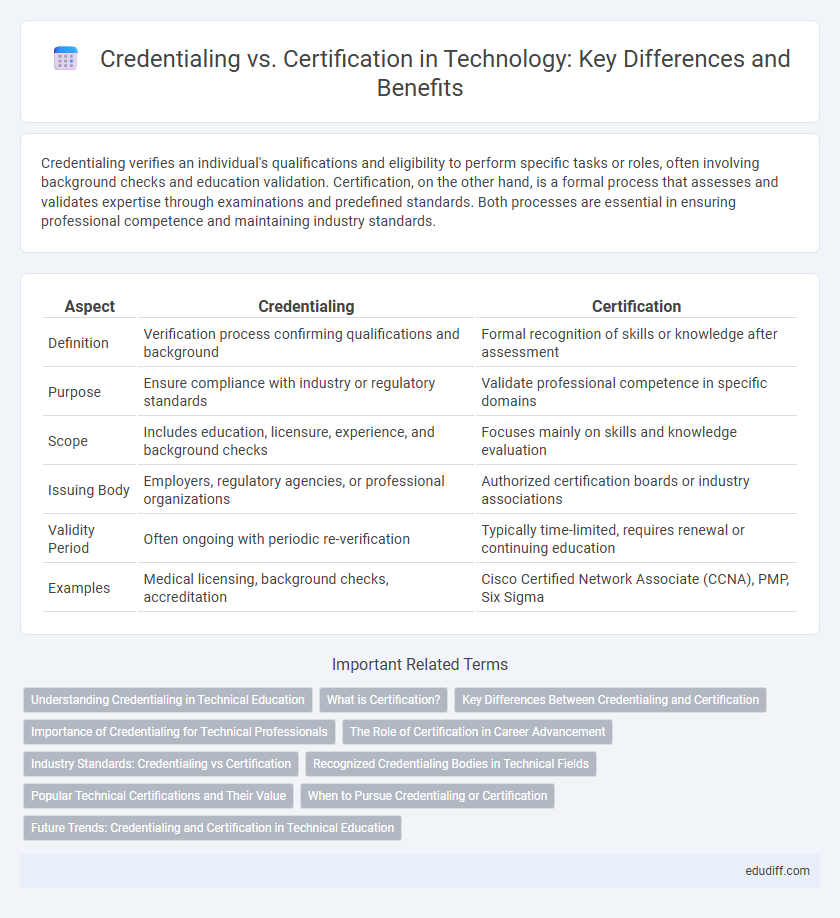Credentialing verifies an individual's qualifications and eligibility to perform specific tasks or roles, often involving background checks and education validation. Certification, on the other hand, is a formal process that assesses and validates expertise through examinations and predefined standards. Both processes are essential in ensuring professional competence and maintaining industry standards.
Table of Comparison
| Aspect | Credentialing | Certification |
|---|---|---|
| Definition | Verification process confirming qualifications and background | Formal recognition of skills or knowledge after assessment |
| Purpose | Ensure compliance with industry or regulatory standards | Validate professional competence in specific domains |
| Scope | Includes education, licensure, experience, and background checks | Focuses mainly on skills and knowledge evaluation |
| Issuing Body | Employers, regulatory agencies, or professional organizations | Authorized certification boards or industry associations |
| Validity Period | Often ongoing with periodic re-verification | Typically time-limited, requires renewal or continuing education |
| Examples | Medical licensing, background checks, accreditation | Cisco Certified Network Associate (CCNA), PMP, Six Sigma |
Understanding Credentialing in Technical Education
Credentialing in technical education verifies an individual's qualifications and competencies through official documentation issued by accredited institutions or regulatory bodies. It serves as a formal recognition of skills acquired via training programs, apprenticeships, or work experience, ensuring standardized industry benchmarks are met. Credentialing supports workforce readiness by validating technical proficiencies necessary for specialized job roles and career advancement.
What is Certification?
Certification is a formal process by which an individual is evaluated and recognized for meeting specific professional standards and competencies set by an authoritative organization. It provides documented proof of expertise and skills in a particular field, often requiring passing exams and adhering to ongoing education requirements. Certification enhances career credibility, supports professional development, and ensures alignment with industry best practices.
Key Differences Between Credentialing and Certification
Credentialing validates an individual's authorization to perform specific tasks based on verified qualifications and adherence to regulatory standards, often involving ongoing compliance monitoring. Certification, on the other hand, is a formal recognition awarded after successfully meeting predetermined criteria or passing an examination, signifying proficiency in a particular skill or knowledge area. Credentialing emphasizes legal permission and background verification, whereas certification highlights professional competency and skill validation.
Importance of Credentialing for Technical Professionals
Credentialing establishes verified qualifications and professional standards essential for technical experts, ensuring their skills meet industry demands and regulatory requirements. It enhances credibility and trust among employers and clients by validating expertise through rigorous assessment and documentation. The credentialing process supports career advancement and continuous professional development, critical in rapidly evolving technical fields.
The Role of Certification in Career Advancement
Certification serves as a critical benchmark in career advancement, validating specific skills and expertise within a profession. It enhances credibility, increases job opportunities, and often leads to higher salary potential by demonstrating an individual's commitment to maintaining industry standards. Employers prioritize certified professionals when making hiring or promotion decisions, making certification a strategic tool for professional growth.
Industry Standards: Credentialing vs Certification
Credentialing verifies an individual's qualifications and adherence to industry standards by assessing education, experience, and competency in a specific field, often maintained through ongoing requirements. Certification, typically granted by independent organizations, validates specialized knowledge and skills against established industry benchmarks through examinations or performance assessments. Both processes ensure professional credibility but differ in scope; credentialing emphasizes eligibility and compliance, while certification focuses on proficiency and expertise within industry standards.
Recognized Credentialing Bodies in Technical Fields
Recognized credentialing bodies in technical fields include organizations like the Institute of Electrical and Electronics Engineers (IEEE), CompTIA, and the International Information System Security Certification Consortium (ISC)2, which set industry standards for validating professional skills. These bodies offer credentialing that involves verifying qualifications and experience, distinguishing it from certification that typically assesses specific knowledge or skills through examinations. Employers in sectors such as information technology, engineering, and cybersecurity rely heavily on these credentials to ensure workforce competence and compliance with industry regulations.
Popular Technical Certifications and Their Value
Popular technical certifications such as CompTIA A+, Cisco's CCNA, and AWS Certified Solutions Architect validate specialized skills and enhance professional credibility within the IT industry. Credentialing often refers to the verification of qualifications and licensing required for specific roles, while certifications demonstrate proven expertise through standardized exams. Earning certifications can significantly improve job prospects, salary potential, and career advancement opportunities in rapidly evolving technical fields.
When to Pursue Credentialing or Certification
Pursuing credentialing is essential when a professional needs formal recognition from a governing body to validate their qualifications for specific roles or industries, often required by employers for regulatory compliance. Certification is best pursued to demonstrate specialized expertise or skills in a particular area, enhancing career advancement and professional credibility. Decision-making should consider industry requirements, career goals, and the specific benefits each process offers.
Future Trends: Credentialing and Certification in Technical Education
Emerging trends in technical education emphasize the growing adoption of digital credentialing platforms that offer verifiable, portable, and stackable micro-credentials aligned with industry needs. Integration of blockchain technology enhances the security and transparency of certifications, enabling seamless employer verification and reducing fraudulent claims. Continuous upskilling is driving demand for adaptive credentialing models that reflect evolving technical competencies and support lifelong learning pathways.
Credentialing vs Certification Infographic

 edudiff.com
edudiff.com